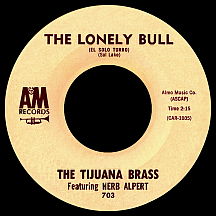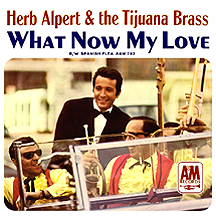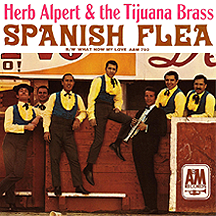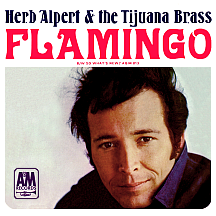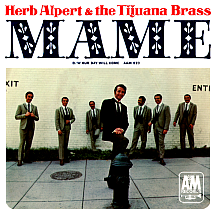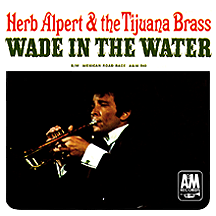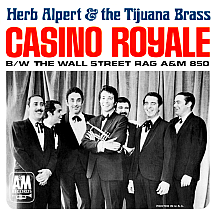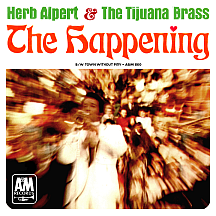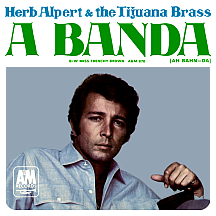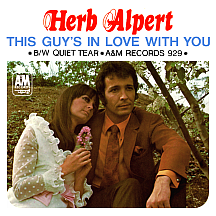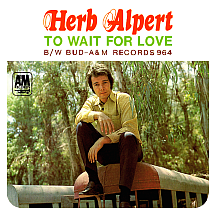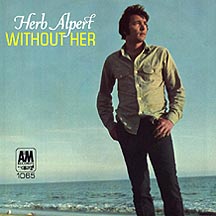HERB ALPERT AND
THE TIJUANA BRASS
While there are quite a few record company owners who have doubled as recording artists, none were quite as successful as Herb Alpert when it came to burning both ends of the candle; it wasn't an easy thing to accomplish, nor did his career play out quite like he intended. One thing's for certain: those trumpet lessons he took as a child paid huge dividends!
Growing up in Los Angeles, he had been playing the instrument ten years by the time he graduated from high school in 1952. The plan was to become a jazz musician, but an Army stint turned that idea into a two-year bugle-blowing exercise. After returning to L.A. he tried to start an acting career, but had only one small nonspeaking part in Cecil B. DeMille's The Ten Commandments. He and Chicago-born Lou Adler started working together as songwriters, which led to a rather primitive first outing, "The Trial" (a novelty "break-in" record in the style of Buchanan and Goodman), released in late 1958 under the thinly-disguised pseudonym Herb B. Lou and the Legal Eagles.
Next up: Herbie Alpert and his Sextet on the Carol label with "Viper's Blues," a jazz instrumental he and Adler had written. Keen Records hired the pair as songwriters and they ran their own label, Andex, a Keen subsidiary, for about a year; another Herbie Alpert single, "Hully Gully," was the final Andex release. During this time he and Lou moonlighted at another Los Angeles record company, Dore, producing several Jan and Dean sessions, starting with the top ten hit "Baby Talk." Their first major hit as songwriters, Sam Cooke's 1960 smash "Wonderful World," was credited to Cooke's wife, Barbara Campbell, though the truth was later revealed as to the song's true authors (Cooke-Adler-Alpert) and subsequent versions, including hit remakes by Herman's Hermits and Art Garfunkel, have shown the corrected songwriter credit.
By the summer of 1961, with his writing and producing career developing at a nice pace, Herb made an unexpected move into singing with a single for RCA Victor under the name of his then-infant son, Dore Alpert. "Gonna Get a Girl" blatantly targeted the teen market, a far cry from any ambitious Miles Davis-level aspirations. A second RCA single, "Little Lost Lover," was his last vocal effort for the label, but he didn't abandon his illusions of singing stardom, though he had a brief non-singing part playing trumpet in a band in the summer '62 comedy film Mr. Hobbs Takes a Vacation starring James Stewart. Adler had begun moving in different circles, so Herb joined forces with Jerry Moss, a former Brooklynite working in L.A. as a record promoter, to start a record company independent of any other affiliations. The two managed to scrape together several hundred dollars, setting up the company in Alpert's garage.
"Tell it to the Birds," another teenybop Dore Alpert vocal disc backed with "Fallout Shelter," an atomic-age love song of sorts, came out on the newly-formed Carnival label. When the "Birds" side started popping up on the Los Angeles airwaves, the tracks were licensed to Dot Records for just enough money to cover Alpert and Moss's initial expenses, after which the single tanked on a national level. After a second Carnival single by Charlie Robinson, the glorified-carport entrepreneurs found out about a previously existing Carnival label, so they simplified their own company name to A&M, after their initials (a short time afterwards, jazz musician Joe Evans threw caution to the wind and started his own New York-based Carnival Records, specializing in soul music, the label's most notable act being The Manhattans).
Herb's career-defining moment came, purely by chance, that summer at a bullfight in Tijuana, Mexico. Impressed by the colorful spectacle of the border town and the crowd's enthusiasm at the event, he set out to recreate the exuberant musical mariachi atmosphere on record. His friend Solomon Lachoff, who went by the name Sol Lake (main claim to songwriting fame: a tune called "Roly Poly," recorded by Doris Day for the film Pillow Talk) had written a song called "Twinkle Star" that Alpert felt could be adjusted to convey the essence of the Baja California city. The song, retitled "The Lonely Bull," was recorded in Alpert's garage with added sound effects of a bullfight crowd and coloratura backing singers. Moss suggested The Tijuana Brass as a catchy name; Featuring Herb Alpert was added the to label because, after all, he was the lead trumpeter on the record...and besides, it was his garage!
So what were the odds of Alpert's toreadorian aria becoming a hit? Bob Moore had already taken a south-of-the-border brass instrumental, "Mexico," to the top ten just a year earlier. Turns out there was room for more of the same...much more, as Herb was to soon find out. "Lonely Bull" hit the top ten in December '62; the album of the same title, containing tracks recorded by Herb and an assortment of studio musicians, started a long chart run at the end of the year. A follow-up single, "Marching Thru Madrid" (also composed by Sol Lake) further succeeded in capturing the desired mood but performed poorly on the charts, as did a quickly-assembled sophomore album, Herb Alpert's Tijuana Brass Volume 2. Figuring the "Bull" had already run its course, Alpert made continuing attempts at establishing himself as a singer with the summer '63 single "Dina," leading many to believe Herb and Dore Alpert were two different people...which of course in real life they were.
What "The Lonely Bull" did provide was increased cash flow that Alpert and Moss immediately invested in expanding the operation. Percussionist Julius Wechter, who'd played on the session for the first Brass album, put together his own group, The Baja Marimba Band, at Herb's suggestion; "Comin' in the Back Door," on Almo International (an A&M imprint, again using Alpert and Moss's names), had a nice run on the charts in late '63 and early '64. They kept the Brass going at this time with "Mexican Drummer Man," featuring vocals by The Blossoms, who had taken the same approach on a number of recent hits including a few by Duane Eddy.
A summer 1964 single, Lake's "The Mexican Shuffle," opened a new avenue for exposing the sounds of the Tijuana Brass when the Clark company used the song in a series of TV commercials for its Teaberry gum, showing happy chewers dancing "The Teaberry Shuffle." Sales of the gum and the Brass album South of the Border, which included the song, took off (the tune was later used in a similar way for Clark's Cinnamint gum, sparking sales of a retitled "Cinnamint Shuffle" by The Johnny Mann Singers, vocals consisting of a rapid-fire 'Da-da-da-da...da-da...'). This pop culture breakthrough prompted Alpert to hire an actual band. Trumpeter Tonni ("The Boss") Kalash signed on to back up Herb's horn; former big band trombonist Bob Edmondson rounded out the trio of blowers. Other members of the permanent seven-man band were pianist Lou Pagani, seasoned jazz guitarist John Pisano, bassist Pat Senatore and drummer Nick Ceroli.
New Orleans songwriter and musician Allen Toussaint's "Whipped Cream," written under his often-used pseudonym Naomi Neville and recorded in 1964 with his band The Stokes, turned out to be icing on the cake of his otherwise long and eventful career. Alpert's Brass made a near exact copy of the arrangement, releasing it on a 45 in early '65 and then as the lead track on the album Whipped Cream and Other Delights. The cover photo of model Dolores Erickson (hand-picked by Herb), nude (or so it seemed) and covered with cream, has become one of the most famous of all album covers, a fantasy figure for many young boys whose parents owned the album! Herb and the TJB were on a roll; TV game show producer Chuck Barris must have been a fan, as he used "Whipped Cream," album track "Lollipops and Roses" and soon-to-be hit "Spanish Flea" as a ready-made music score for his popular series The Dating Game, which debuted in December. Factoring in radio play and use on radio and TV commercials, the instrumental Brass tracks had effectively become part of the background music of people's daily lives. Who can say how many bought the album subliminally as a result?
A lively reworking of Anton Karas's "3rd Man Theme" was an intended A side, but another Whipped track, Bobby Scott's "Taste of Honey" on the flip side, caught on big in the fall, reaching the top ten on Billboard (the first to do so since "Lonely Bull" three years earlier) and number one on the Cash Box chart in December. Less than three months later the song was a three time winner at the March '66 Grammy ceremony, topping the night with the award for Record of the Year (following "(Theme from) A Summer Place" by Percy Faith in 1961, it was the second time an instrumental won in the top category...and it hasn't happened since).
A&M was growing nicely as Alpert and Moss signed promising new acts to the label. L.A.-area band We Five had already scored with the summer '65 hit "You Were on My Mind." "Let's Dance" man Chris Montez got a second lease on life with the label in '66. The Sandpipers and bossa nova band Sergio Mendes and Brasil '66 (featuring Alpert's future wife, lead vocalist Lani Hall) had strong starts that year. Meanwhile, the TJB hit machine kept rolling: "Zorba the Greek," more frantically realized than Mikis Theodorakis's original theme from the film starring Anthony Quinn, endures today as a favorite tension-builder at sporting events. "Tijuana Taxi" could be considered an instrumental novelty song, while the non-gimmicky "What Now My Love" was a hit on the heels of Sonny and Cher's early-'66 version.
The chart-topping dominance of the Whipped Cream LP set off a widespread case of Tijuana Mania; the next two albums, Going Places!! and What Now My Love, had long stretches at number one, while earlier long-plays (Lonely Bull, TJB Volume 2 and South of the Border) made impressive returns, resulting in all six of the act's albums simultaneously placing high on the charts over several months in '66, a distinction even their main mid-'60s rivals from Liverpool, England hadn't achieved. Were The Beatles music's only phenomenon of the mid-'60s? Hardly. The Fab Four had captured the hearts of young record buyers, but the Tijuana Brass appealed to a larger demographic covering, say, adolscence to retirement age! Alpert's music had worked its way deep into '60s pop culture.
At about this time Alpert purchased Charlie Chaplin's 47-year-old Hollywood movie studio lot at the corner of Sunset Boulevard and La Brea Avenue (Chaplin had already sold the property in 1953 and it had gone through a few different owners including actor-comedian Red Skelton). Alpert and Moss converted two of Chaplin's sound stages into a recording studio while keeping most of the historic film lot intact. Herb's initial creative instincts reignited in these new surroundings as he sought to create a kind of jazz compatible to the Mexican brass concept; Nat Adderley and Oscar Brown, Jr.'s "The Work Song," "Flamingo" (previous versions by Duke Ellington and Earl Bostic) and "Wade in the Water" (a traditional song already a hit in the summer of '66 for The Ramsey Lewis Trio) met with positive reviews and what had become routinely strong airplay and sales.
Herb still couldn't shake his desire to be a singer, indulging himself a bit with "Mame" (Jerry Herman's title tune from the hot Broadway musical based on Auntie Mame), his first vocal single not to use his son Dore's name. To cap things off in Alpert's peak year of 1966, John Hubley directed a humorous five minute animated film, A Herb Alpert and the Tijuana Brass Double Feature, incorporating "The Mexican Shuffle," "Spanish Flea" and "Tijuana Taxi" and winning an Oscar for Best Short Subject, Cartoon. The instrumental hits kept coming in '67, Burt Bacharach and Hal David's fabulous "Casino Royale" (theme from the not-so-fabulous but popular James Bond parody) preceding "The Happening" (another instant-remake hit, succeeding The Supremes this time around) and "A Banda." Sounds Like... placed the group at number one on the album charts for the fourth time in July.
CBS television (the former owners of Chaplin's studio lot who had sold the property to Alpert and Moss for a cool million in cash) offered Herb a chance to do a one hour special. Singer Presents Herb Alpert & the Tijuana Brass, sponsored by the 100-year-old sewing machine company, aired in April 1967. Opening in a bullfighting arena, it also featured a segment in the former Chaplin studio. On a second variety special, The Beat of the Brass in April '68, Herb sang a new Bacharach-David song, "This Guy's in Love With You," to his wife Sharon, who appeared with him (they divorced a few years later after 15 years of marriage, the song's impact apparently worn thin by that time). The song was a sensation; released as a single post-broadcast, it shot to number one, a first for A&M and its already highly successful composers (by rare coincidence, fellow trumpeter Hugh Masekela's instrumental "Grazing in the Grass" knocked the record off the top after four weeks). In July, companion release The Beat of the Brass became the fifth number one album for Alpert and the Brass (to that point only the Beatles and Elvis Presley had more number one albums).
Herb followed with two more vocal singles, Bacharach and David's "To Wait For Love" and Harry Nilsson's "Without Her," but they paled in comparison to "This Guy's in Love." By the time a third TV special, The Brass Are Comin', aired in October 1969, a shift in the public's taste in music was becoming evident; Tijuana Brass albums were issued less frequently until the group disbanded in '75. Herb Alpert continued as a solo act, scoring several hits along the way including a chart-topping instrumental, "Rise," in '79. His time was preoccupied by more pressing matters from the 1970s onward as A&M Records emerged as a major player in the record industry. The company developed one superstar after another: The Carpenters, Cat Stevens, Billy Preston, Peter Frampton, The Police...I'll stop there at the risk of creating a list that would expand this discourse into something twice as long as it already is.
NOTABLE SINGLES:
- The Trial - 1958
by Herb B. Lou and the Legal Eagles - Viper's Blues - 1959
as Herbie Alpert and his Sextet - Hully Gully - 1959
as Herbie Alpert and his Sextet - Gonna Get a Girl - 1961
as Dore Alpert - Tell it to the Birds - 1962
as Dore Alpert - The Lonely Bull (El Solo Torro) - 1962
as the Tijuana Brass featuring Herb Alpert / - Acapulco 1922 - 1962
as the Tijuana Brass featuring Herb Alpert - Marching Thru Madrid - 1963
as Herb Alpert's Tijuana Brass / - Struttin' With Maria - 1963
as Herb Alpert's Tijuana Brass - Dina - 1963
as Dore Alpert - Mexican Drummer Man - 1964
as Herb Alpert's Tijuana Brass - The Mexican Shuffle - 1964
as Herb Alpert's Tijuana Brass - South of the Border - 1964
as Herb Alpert's Tijuana Brass - Whipped Cream - 1965
as Herb Alpert's Tijuana Brass - Mae - 1965
- 3rd Man Theme /
Taste of Honey - 1965 - Zorba the Greek /
Tijuana Taxi - 1966 - What Now My Love /
Spanish Flea - 1966 - The Work Song - 1966
- Flamingo /
So What's New? - 1966 - Mame - 1966
- Wade in the Water - 1967
- Casino Royale - 1967
- The Happening - 1967
- A Banda - 1967
- Carmen - 1968
- Cabaret /
Slick - 1968 - This Guy's in Love With You - 1968
as Herb Alpert - To Wait For Love - 1968
as Herb Alpert - My Favorite Things - 1968
- Zazueira - 1969
- Without Her - 1969
as Herb Alpert


